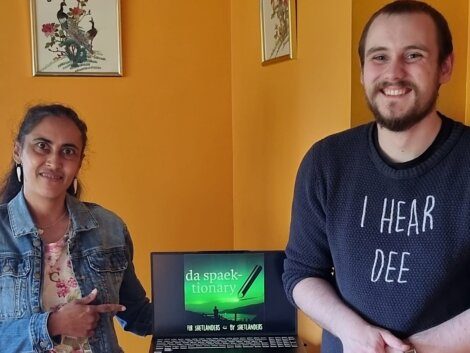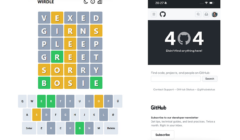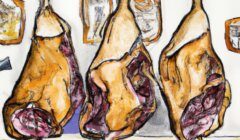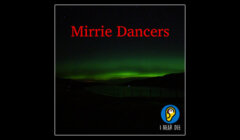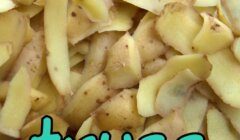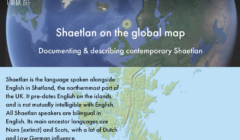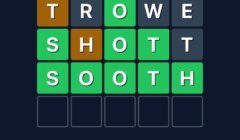Community / Team behind new online dictionary of Shaetlan hopes for lively community participation
Project aims to reflect local language as it is spoken today in different parts of Shetland
SPEAKERS of the local language now have the chance to actively help collect and record words and phrases relevant to Shaetlan, thanks to a new initiative by language group I Hear Dee.
Creating an interactive dictionary with the help of the local community also enables the new online tool to become a representative snapshot of contemporary local speech as it will include local versions of today’s words and expressions.
The Spaektionary online dictionary went live today (Saturday) at https://spaek.org
It comes in the same week that local dialect group Shetland ForWirds launched an app to give easy access to its database based on the John Graham dictionary.
The idea to create an open-ended resource that will grow through community participation was first hatched by Shetlander James Stewart.
During Christmas celebrations a few years back his Whalsay granny encouraged those gathered around the dinner table to ‘gromish in aboot it’ when a large plate of chips was carried in without any serving spoons.
Stewart, who now lives in Ayrshire and works as a software engineer, said she obviously meant that they should just use their hands, but it was an expression he had never heard and soon realised that this and many others would be lost if not recorded.
“I have a granny in Whalsay and one in Burra,” he continued, “and they both have different words for ‘spaegie’ [muscle soreness or fatigue]. Granny in Burra says ‘creeks’ and my granny in Whalsay says it’s ‘hansper’.”
He has now created an online database with the help of Dr Viveka Velupillai and Roy Mullay that with its nearly 8,000 entries over time is set to become the largest dictionary of Shaetlan since the Faroese linguist Jakob Jakobsen collected around 10,000 entries of the remnants of Norn that was spoken in Shetland around 130 years ago.
Become a member of Shetland News
The dictionary consists of the Shaetlan project lexical database, which is built on a corpus of 20 Shetland Museum and Archives oral history recordings adding up to around 316,000 words.
It also includes entries from a series of sources including Alastair and Adaline Christie-Johnson’s Shetland Words, John Graham’s The Shetland Dictionary and Shetland ForWirds’ Mirds o Wirds.
“The purpose of the dictionary is to let the community of Shaetlan speakers pull together to enhance and enlarge this dictionary,” Dr Velupillai said.
“What we are hoping for is community engagement, so that people will record their voices saying the words/expressions, as well as add words/expressions or definitions that are missing in the dictionary.”
Stewart said: “I guess my grannies have a bit of a role in me trying to preserve some of this language and understand the geographical origin of it.”
The new dictionary so far lists five different words for ‘muscle pain’ that are being used in different parts of Shetland. There may well be more.
Dr Velupillai, a linguistic professor at the University of Giessen in Germany, said the I Hear Dee project was the result of her scientific project to document and describe Shaetlan. The dictionary project, she said, will help safeguard the language.
“A crowdsourced community dictionary like this will place Shaetlan at the global forefront of digital language tools and pave the way for more global recognition of Shaetlan,” she said.
It ties in with a number of other projects I Hear Dee has launched during the last 12 months, including developing predictive text in Shaetlan for mobile phones, launching a localised version of the viral word game Wordle and, only two months ago, publishing a first bilingual grammatical description of the local language.
“The dictionary is web based but is designed to be accessible on mobile phone web browsers.” Dr Velupillai said.
“The code is open source and available for anyone, which means that other endangered languages can build their own Spaektionary equivalents if they want to.
“It is likely that my international colleagues will want guidance on how to make something similar for the languages that they are working on; that was what happened after we launched Wirdle.”
Stewart meanwhile said the launch of the project on Saturday was not the end of the project but very much the start of an exciting new phase in keeping the local tongue alive. “I would love for it to evolve further,” he said.
One possible next step to deeply dip into local knowledge is to organise a tour through village halls, celebrate the dialect and move beyond online.
“I would like to have offline meetings that tie in with the online base of the dictionary,” Stewart said, “because getting my granny to use it online is probably quite unrealistic.”
Upon registration https://spaek.org users will be able to add words and example sentences, record pronunciations, or comments on entries. The website also has a large FAQs section and features a Shetland word of the day, which today is ‘peerie’
Become a member of Shetland News
Shetland News is asking its many readers to consider paying for membership to get additional features and services: -
- Remove non-local ads;
- Bookmark posts to read later;
- Exclusive curated weekly newsletter;
- Hide membership messages;
- Comments open for discussion.
If you appreciate what we do and feel strongly about impartial local journalism, then please become a member of Shetland News by either making a single payment, or setting up a monthly, quarterly or yearly subscription.






